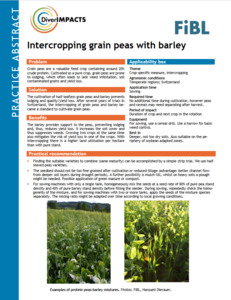{Tool} Intercropping grain peas with barley (DiverIMPACTS Practice Abstract). [Zwischenfruchtanbau von Körnererbsen und Gerste (DiverIMPACTS Practice Abstract).] Creator(s): Klaiss, Matthias; Gelencsér, Tobias and Weidmann, Gilles. Issuing Organisation(s): FiBL - Research Institute of Organic Agriculture. DiverIMPACTS Practice abstract. (2020)
|
PDF
- Published Version
- English
(Intercropping grain peas with barley)
251kB | |
![[thumbnail of Screenshot 2024-04-19 at 14-32-13 Intercropping grain peas with barley - 41890-PA-DiverIMPACTS-Klaiss-etal-2020-intercropping-grain-peas-barley.pdf.png]](/41890/3.hassmallThumbnailVersion/Screenshot%202024-04-19%20at%2014-32-13%20Intercropping%20grain%20peas%20with%20barley%20-%2041890-PA-DiverIMPACTS-Klaiss-etal-2020-intercropping-grain-peas-barley.pdf.png)  Preview |
Image (PNG)
- Cover Image
- English
390kB |
Document available online at: https://zenodo.org/record/3794916
Summary in the original language of the document
This tool provides practical recommendations for intercropping peas and barley and explains the benefits such as barley providing support to the peas, preventing lodging
and, thus, reducing yield loss. It also increases the soil cover and thus suppresses weeds. Growing two crops at the same time also mitigates the risk of yield loss in one of the crops. With intercropping there is a higher land utilisation per hectare than with pure stand.
Summary translation
Diese Arbeitshilfe enthält praktische Empfehlungen für den Zwischenfruchtanbau von Erbsen und Gerste und erläutert die Vorteile, wie z. B. die Unterstützung der Erbsen durch die Gerste, das Verhindern von Lagerbildung
und somit die Ertragseinbußen verringert. Außerdem erhöht er die Bodenbedeckung und unterdrückt so Unkraut. Der gleichzeitige Anbau von zwei Kulturen mindert auch das Risiko von Ertragseinbußen bei einer der beiden Kulturen. Beim Zwischenfruchtanbau ist die Flächennutzung pro Hektar höher als beim Reinbestand.
| EPrint Type: | Practice tool |
|---|---|
| Teaser: | Learn about the benefits of cultivating half-leafless grain peas and barley. |
| What problem does the tool address?: | Grain peas are a valuable feed crop containing around 20% crude protein. Cultivated as a pure crop, grain peas are prone to lodging, which often leads to late weed infestation, soil contaminated grains and yield loss. |
| What solution does the tool offer?: | The cultivation of half-leafless grain peas and barley prevents lodging and quality/yield loss. After several years of trials in Switzerland, the intercropping of grain peas and barley be-came a standard to cultivate grain peas. |
| Country: | Switzerland |
| Type of Practice Tool: | Practice abstracts |
| Keywords: | peas, grain peas, barley, intercropping |
| Agrovoc keywords: | Language Value URI English peas http://aims.fao.org/aos/agrovoc/c_13177 English barley http://aims.fao.org/aos/agrovoc/c_823 English intercropping http://aims.fao.org/aos/agrovoc/c_3910 |
| Subjects: | Crop husbandry > Crop combinations and interactions Crop husbandry > Production systems > Cereals, pulses and oilseeds |
| Research affiliation: | Switzerland > FiBL - Research Institute of Organic Agriculture Switzerland > Crops > Arable crops > Cereals Switzerland > FiBL - Research Institute of Organic Agriculture Switzerland > Crops > Arable crops > Legumes Switzerland > FiBL - Research Institute of Organic Agriculture Switzerland > Crops > Anbautechnik > Mixed cropping European Union > Horizon 2020 > Diverimpacts European Union > Organic Farm Knowledge |
| Horizon Europe or H2020 Grant Agreement Number: | 727482 |
| Related Links: | https://www.diverimpacts.net/, https://organic-farmknowledge.org/tool/41890, https://zenodo.org/record/3794916, https://www.facebook.com/organicfarmknowledge/posts/329484452297529, https://twitter.com/farm_knowledge/status/1433341342340501509 |
| Project ID: | ofk |
| Deposited By: | Forschungsinstitut für biologischen Landbau, FiBL |
| ID Code: | 41890 |
| Deposited On: | 26 Aug 2021 11:09 |
| Last Modified: | 02 May 2024 10:32 |
| Document Language: | English |
| Status: | Published |
Repository Staff Only: item control page

 Download Statistics
Download Statistics Download Statistics
Download Statistics
